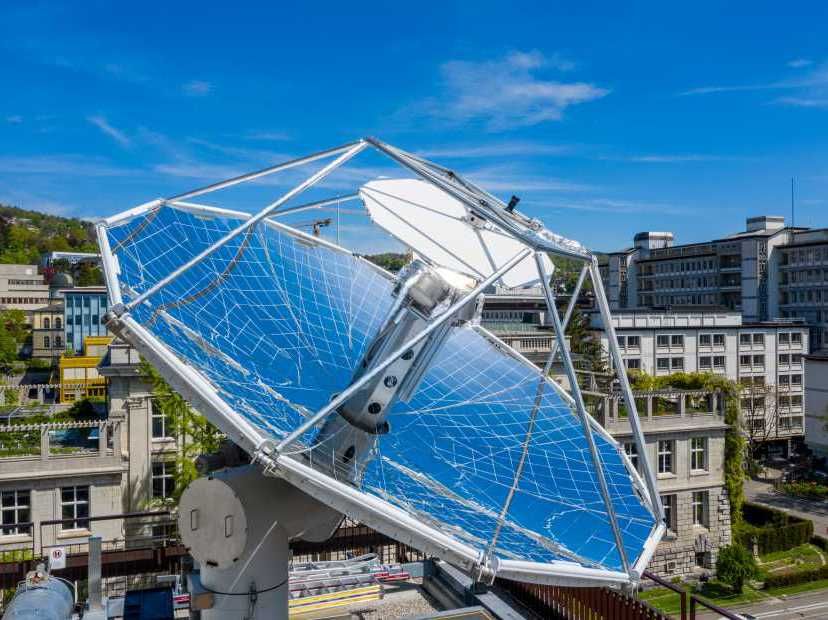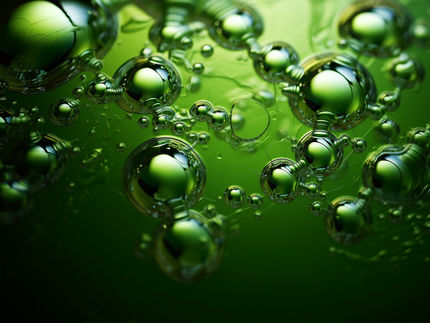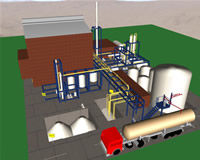New solar mini-refinery
Carbon-neutral fuel made from sunlight and air: Two spin-offs already founded
Researchers from ETH Zurich have developed a novel technology that produces liquid hydrocarbon fuels exclusively from sunlight and air. For the first time worldwide they demonstrate the entire thermochemical process chain under real field conditions. The new solar mini-refinery is located on the roof of ETH’s Machine Laboratory building in Zurich.

The research plant is located on the roof of the ETH building on Sonneggstrasse.
© ETH Zurich / Alessandro Della Bella
Carbon-neutral fuels are crucial for making aviation and maritime transport sustainable. ETH researchers have developed a solar plant to produce synthetic liquid fuels that release as much CO2 during their combustion as previously extracted from the air for their production. CO2 and water are extracted directly from ambient air and split using solar energy. This process yields syngas, a mixture of hydrogen and carbon monoxide, which is subsequently processed into kerosene, methanol or other hydrocarbons. These drop-in fuels are ready for use in the existing global transport infrastructure.
Aldo Steinfeld, Professor of Renewable Energy Carriers at ETH Zurich, and his research group developed the technology. “This plant proves that carbon-neutral hydrocarbon fuels can be made from sunlight and air under real field conditions,” he explained. “The thermochemical process utilises the entire solar spectrum and proceeds at high temperatures, enabling fast reactions and high efficiency.” The research plant at the heart of Zurich advances ETH’s research towards sustainable fuels.
A small demonstration unit with big potential
The solar mini-refinery on the roof of ETH Zurich proves that the technology is feasible, even under the climate conditions prevalent in Zurich. It produces around one decilitre of fuel per day. Steinfeld and his group are already working on a large-scale test of their solar reactor in a solar tower near Madrid, which is carried out within the scope of the EU project sun-to-liquid. The solar tower plant was presented to the public in Madrid at the same time as the mini-refinery in Zurich.
The next project goal is to scale the technology for industrial implementation and make it economically competitive. “A solar plant spanning an area of one square kilometre could produce 20,000 litres of kerosene a day,” said Philipp Furler, Director (CTO) of Synhelion and a former doctoral student in Steinfeld’s group. “Theoretically, a plant the size of Switzerland – or a third of the Californian Mojave Desert – could cover the kerosene needs of the entire aviation industry. Our goal for the future is to efficiently produce sustainable fuels with our technology and thereby mitigate global CO2 emissions.”
Two spin-offs already
Two spin-offs already emerged from Aldo Steinfeld’s research group: Synhelion, founded in 2016, commercializes the solar fuel production technology. Climeworks, founded already in 2010, commercialises the technology for CO2 capture from air.
Topics
Organizations
Other news from the department science

Get the chemical industry in your inbox
By submitting this form you agree that LUMITOS AG will send you the newsletter(s) selected above by email. Your data will not be passed on to third parties. Your data will be stored and processed in accordance with our data protection regulations. LUMITOS may contact you by email for the purpose of advertising or market and opinion surveys. You can revoke your consent at any time without giving reasons to LUMITOS AG, Ernst-Augustin-Str. 2, 12489 Berlin, Germany or by e-mail at revoke@lumitos.com with effect for the future. In addition, each email contains a link to unsubscribe from the corresponding newsletter.
Most read news
More news from our other portals
Something is happening in the chemical industry ...
This is what true pioneering spirit looks like: Plenty of innovative start-ups are bringing fresh ideas, lifeblood and entrepreneurial spirit to change tomorrow's world for the better. Immerse yourself in the world of these young companies and take the opportunity to get in touch with the founders.





























































